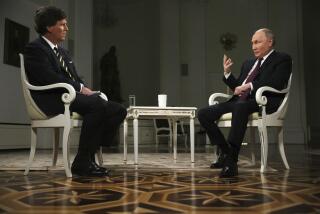A FESTIVAL OF NATIONS : Presidents Jest With the Press : A Dig at the Media Reveals Common Ground
- Share via
HYDE PARK, N.Y. — Russian President Boris N. Yeltsin could not have given his host, President Clinton, a better gift--a belly laugh at the expense of the White House and Kremlin press corps.
As the two presidents stood Monday on the steps of Franklin D. Roosevelt’s family mansion here, Yeltsin said that if he had believed what he read in the press, their summit would have been nothing short of a disaster.
“Now, for the first time,” said Yeltsin, pointing to the line of cameras stationed in front of him, “I can tell you that you are a disaster.”
Clinton, who can never quite be certain what Yeltsin will say, doubled over in laughter. So long and hard did he laugh that his face turned red and he had to wipe tears from his eyes.
“Make sure you get the attribution right,” Clinton said. Then he laughed some more.
If the two presidents had their differences at the lush Roosevelt estate, they apparently agreed completely on the perils of dealing with an unpredictable press.
Yeltsin’s media followers, who number a mere 50 compared with the 100 or so who routinely travel overseas with Clinton, are less proudly independent of their government than is the American press corps. But correspondents from today’s Russian media are vastly different from those of the old Soviet days, when a reporter dared not stray from the state-approved story.
“There is a narrowing of differences between the two media,” said Peter Silantyev, a counselor for the information department at the Russian Embassy in Washington.
“It is not only the professional qualities that are being borrowed, but also some other things that are not so good--the sensationalism, for example. Maybe it’s just a natural side effect of the changes in this profession.”
Since the dissolution of the Soviet Union, a range of newspapers, magazines and television programs--some excellent, some as bad as America’s worst--has burst forth in Russia. In a recent article in IPI Report, a publication of the International Press Institute, a British reporter said that many Russian news organizations are still dependent on the Russian government for funds--a circumstance that keeps them docile.
Those reporters who have developed some independence have a difficult time with their politicians. Igor Malashenko, general director of Russia’s first independent and privately funded television station, NTV, says 90% of Russia’s politicians want the media to be controlled by the state.
One of Malashenko’s reporters here, Vladimir Luskanov, said he has been critical of Yeltsin’s policies in the past. In particular, he angered the Yeltsin government when he shot film in Chechnya earlier this year that the more official television networks would not air. Still, Luskanov said, he does not like to criticize the president in a personal way.
“We never criticize Yeltsin openly,” Luskanov said as he prepared for the meeting in Hyde Park. “He was elected president, after all, and we feel it is not professional.
“We are trying to point out his good points as well as his not-so-good. Sometimes, when he listens to what we say today, he will say it tomorrow.”
More to Read
Sign up for Essential California
The most important California stories and recommendations in your inbox every morning.
You may occasionally receive promotional content from the Los Angeles Times.













